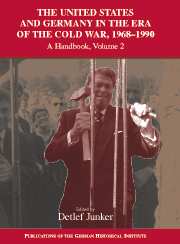Book contents
- Frontmatter
- POLITICS: Détente and Multipolarity: The Cold War and German-American Relations, 1968-1990
- SECURITY: German-American Security Relations, 1968-1990
- 1 A Limit to Solidarity-Germany, the United States, and the Vietnam War
- 2 NATO Strategy and the German-American Relationship
- 3 Differences on Arms Control in German-American Relations
- 4 The NATO Double-Track Decision, the INF Treaty, and the SNF Controversy - German-American Relations between Consensus and Conflict
- 5 The Shifting Military Balance in Central Europe
- 6 The Transfer of American Military Technology to Germany
- 7 German-American Intelligence Relations: An Ambivalent Partnership
- 8 No Unity Without Security: The Security Features of German Unification
- ECONOMICS: Cooperation, Competition, and Conflict: Economic Relations Between the United States and Germany, 1968-1990
- CULTURE: Culture as an Arena of Transatlantic Conflict
- SOCIETY: German-American Societal Relations in Three Dimensions, 1968-1990
- 1 “1968”: A Transatlantic Event and Its Consequences
- OUTLOOK: America, Germany, and the Atlantic Community After the Cold War
- Index
4 - The NATO Double-Track Decision, the INF Treaty, and the SNF Controversy - German-American Relations between Consensus and Conflict
Published online by Cambridge University Press: 05 January 2013
- Frontmatter
- POLITICS: Détente and Multipolarity: The Cold War and German-American Relations, 1968-1990
- SECURITY: German-American Security Relations, 1968-1990
- 1 A Limit to Solidarity-Germany, the United States, and the Vietnam War
- 2 NATO Strategy and the German-American Relationship
- 3 Differences on Arms Control in German-American Relations
- 4 The NATO Double-Track Decision, the INF Treaty, and the SNF Controversy - German-American Relations between Consensus and Conflict
- 5 The Shifting Military Balance in Central Europe
- 6 The Transfer of American Military Technology to Germany
- 7 German-American Intelligence Relations: An Ambivalent Partnership
- 8 No Unity Without Security: The Security Features of German Unification
- ECONOMICS: Cooperation, Competition, and Conflict: Economic Relations Between the United States and Germany, 1968-1990
- CULTURE: Culture as an Arena of Transatlantic Conflict
- SOCIETY: German-American Societal Relations in Three Dimensions, 1968-1990
- 1 “1968”: A Transatlantic Event and Its Consequences
- OUTLOOK: America, Germany, and the Atlantic Community After the Cold War
- Index
Summary
Translated by Richard Sharp
THE U.S. NUCLEAR PROTECTION GUARANTEE FOR THE FEDERAL REPUBLIC: THE TENSION BETWEEN COMMON AND DIVERGENT INTERESTS
The U. S. Nuclear Protection Guarantee for the Federal Republic: The Tension Between Common and Divergent Interests: The United States' nuclear protection guarantee for the Federal Republic of Germany served the interests of both sides throughout the East-West conflict. Because of the limitations on its sovereignty and its military, the Federal Republic was dependent on collective defense through the alliance and on the U.S. nuclear shield. Western Germany was the geostrategic key to the United States' strategic interest in preventing Europe's domination by the Soviet Union, the new hostile superpower. Protecting West Germany was thus a strategic American interest.
It was increasingly difficult, however, for the United States to give credibility to this strategic imperative - to include the Federal Republic within its deterrent - as a consequence of Soviet arms competition. If the threat to use nuclear weapons in defense of an ally is to be effective, a nation must itself be prepared to be a target of nuclear attack. The credibility of the threat of American retaliation suffered when the United States became vulnerable in the late 1950s. To counteract doubts after the introduction of flexible response strategy, the United States not only had to strengthen Europe's conventional defenses, but also needed the possibility of a nuclear response that would not lead automatically to escalation and thus to a U.S.-Soviet nuclear exchange. Limiting the scope of nuclear warfare resulted in making German territory the main nuclear battleground, which unavoidably raised the threat for America's nuclear protectorate.
- Type
- Chapter
- Information
- The United States and Germany in the Era of the Cold War, 1945–1990A Handbook, pp. 148 - 154Publisher: Cambridge University PressPrint publication year: 2004



